Spoiler Warning: I’m going to mention stuff in the book, and by dint of mentioning them it’s going to involve mentioning things in the previous two books that make up the first half of The Locked Tomb trilogy. That is to say, there’s very little talking about Nona The Ninth that isn’t spoilery. Also, I guess there’s a lot of content-warning stuff in this book and also all the others, but I suppose you don’t go into a book promoted as lesbian space necromancer murder mystery thinking you’re about to get something G-rated. Point is if you’re wondering if I liked these books but don’t want to know anything about them before you read them I liked them a lot and this is your warning, your chance to bail.
Let’s talk about girls.
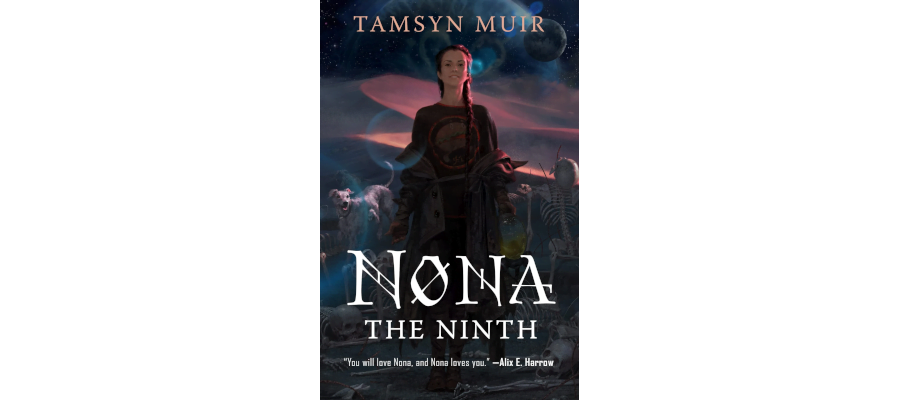
Nona The Ninth is a teen coming of age story set in a science-fantasy lived-apocalypse story written by someone who tells the story of another, real, own lived-apocalypse in the backstory. It’s about a character who starts the story very naive, putting together clues about her reality from her lived experiences, and ends with the same character, still very naive, but not so much that she can’t appreciate her death. It feels like an entire narrative built to make you love Nona, to be curious about Nona, and then, perhaps, at the end, to consider what it means to grieve for Nona.
There’s mystery all through the book. Honestly, I feel now, that it’s pretty reasonable to say that all the Locked Tomb books are mystery novels. I talk at times about how tricks, how magic, are about controlling attention and this book does it masterfully. I used an audiobook, which was great for getting through the book while doing other things, but it did mean that there were times I keenly felt the need to flip back a few pages, to double check something. Particularly, I feel like this book doesn’t much discuss Pyrrha’s body or appearance, but it does discuss the way she interacts with people. She touches, she lifts, she holds, she hugs.
I think I went the whole book without having anyone misgender Pyrrha, despite the fact she was, as best I understood it, in the body that had formerly been Gideon the First. Pyrrha shaves at one point, but again, that’s just noticing the things that characters do, rather than necessarily being explicit about how they look, how they present. Nona, as a character, transcends language and doesn’t have assumptions about societal associations: because she’s not a person the way that most everyone else in the setting is. That’s saying a lot in a setting that is largely pretty flexible in what you consider ‘a person.’
It’s a sort of fine crafting and character focused storytelling that makes me ache with jealousy. The skill. It also makes me reflect on my own writing and get a little embarrassed. I spent time hunting for details Nona wouldn’t think to mention, and that meant that there were sometimes very obvious things I missed, because I was too busy trying to look under and around them. This meant that I didn’t really realise that I was hours into the book with opinions on characters and a desire that their stories work out okay. When the second third of the book kicks in and suddenly familiar faces are showing up – I mean more familiar faces – it comes with a lurch of realising oh no, things aren’t going the way they need to for the story to go where I was hoping for. Which sucked, because I really wanted the characters to all have a nice day, maybe a little snack.
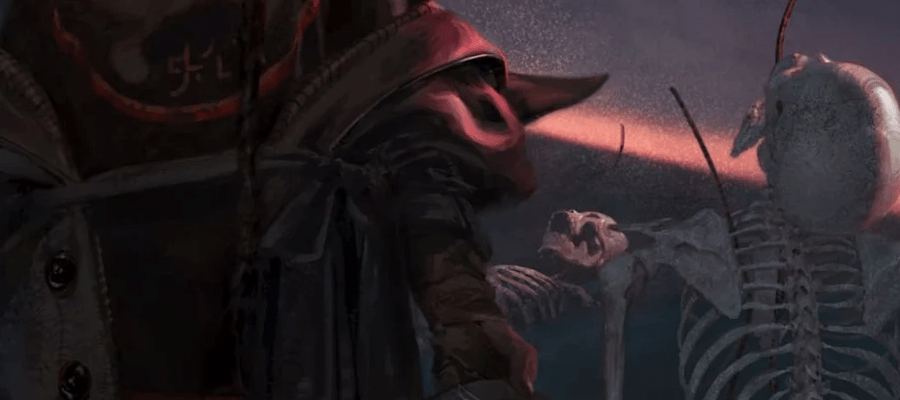
And so again, it’s another exquisitely crafted, intricately worded, engaging mystery story set in a science-fantasy universe full of characters I love, and built on a real anxiety I feel. It’s more The Locked Tomb. I really liked the other two parts of The Locked Tomb I’ve read, and I like this one too. In the most boring way: This is as excellent as the others and I liked it as much. I want a Hamburger With Feet shirt. I want to see more of where this story goes. There’s no question answered in this book that I felt was given an unsatisfying answer, and the conclusion leaves me excited to know where the story is going next.
I’m trying very hard to get out of a bad habit that I developed for being taken seriously, which is, when referring to a text, and what I see in it, saying something like ‘what Muir has done here.’ It seems that The Locked Tomb is uniquely positioned for me to do that. I could easily just say ‘you see here Muir’s sense of humour as she chooses to do this and that and also the other secret third thing,’ and that wouldn’t really be seen as actually wrong, and it’s one of the ways you’re encouraged to write in Academia (covertly), because it’s a good habit to always be mindful of sourcing your ideas. If I am trying to summarise the ideas of Bernard Suits, I should say ‘Here this model represents as Bernard Suits suggested, doot de da da doot.’
Thing is, when that’s a habit I bring to bear on non-academic writing it makes me feel like I’m doing two things I hate:
- Presenting my interpretation as an objective reality
- Demonstrating access to the author I don’t have through the writing because I have a giant space brain and can somehow do telepathy because of how she chooses to describe Coronabeth’s tits
And the funny thing is, I feel really sensitive about ever trying to imply that I have some special insight to this author, to be able to tell you what she thinks. Like I imagine she’s going to read this and bully me about it. Even if it didn’t make me sound like I was trying to divine reality out of layers of tea leaves, it’d be just be rude. It’s going to show up in all the caution I have when describing this plot, because I really, really need to be honest that this isn’t what ‘the story’ is doing: it’s what I got out of this story.
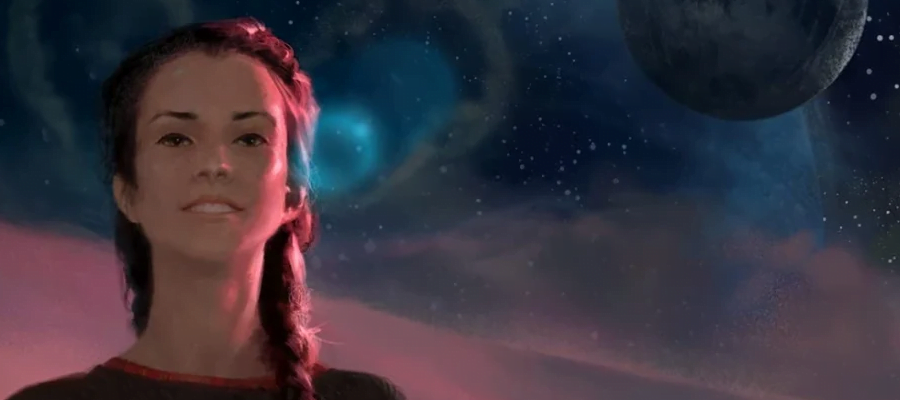
I got a lot out of this story.
First, I got a different perspective on what The Locked Tomb books are. Each book seems built around a theme they’re focused on, with ideas like trust and memory and then, in Nona The Ninth, love. I talked about how a necromantic empire meant that the story of Gideon the Ninth lets a story have a whole world spanning cultural landscape while still being about, like, twenty guys, and then Nona the Ninth steps back, then back, then back and says but what about the world that’s not like that?
I didn’t get to see all the world. I got to see a sliver of a sliver of it. The politics, the desperation, the struggle, all of it just over the head of Nona. I had to imagine what it was, what was really happening. Particularly harrowing was thinking about how this crush of sad and angry and overheated people were living under the shadow of an angry moon but still had to go to work and school and the supermarket because the apocalypse also gets to be kinda boring, which sucks.
I got to see Nona’s experiences of the life Nona was living, on a world at the edge of the empire. Using Nona as focus meant that there was a horrible fatalism to a very real feeling of someone young, and stupid, who is pretty sure the world is going to end very soon and has no reason to believe otherwise. I felt her feeling the heat of a world that is too hot, and staying too hot. I remembered leaving the house with masks and hats, for the sun and the smoke, because of the fires. There’s a lot of the story here that feels true to an experience that doesn’t have a lot of places to show up. Apocalyptic cults suck, and it sucks even more to escape one apocalyptic vision of the world only to realise you’ve got another, much worse one that doesn’t even have cool locust-horse hybrids.
Cooked down to the syrup, Nona the Ninth is the story of how an object that you didn’t know was in Place A eventually found its way to Place B. In the purest and most story-mechanical sense, if you see the point of the Locked Tomb as being a narrative that you start in Gideon the Ninth, which is centered on the story of Gideon Nav and Harrowhark Nonagesimus (wrote that one without looking it up, let’s hope that doesn’t come back to bite me, pretty confident it will, gunna look it up later and try not to correct myself and leave this hilarious aside in), then I can imagine making a case that this book is more than it needs to be. The narrative could just yadayadayada how the pieces got moved around and it wouldn’t, really, be a problem for that other, greater story.
Something about the storytelling in The Locked Tomb that I didn’t expect going in and only now can see in hindsight, is that the narratives are so honest with me in ways I wasn’t expecting. In Harrow the Ninth there’s a whole narrative device set up around being in Harrow’s head, and how that gives you access to an omniscient removed narrator and an extremely attached, not-omniscient narrator. I see the same thing here – where the narrative in this story is exclusively attached to Nona. Scenes are either told from the perspective of Nona’s body, or Nona’s soul. The chapters of the book of John, which Harrow has, are the body Nona occupies (and therefore, Harrow). The final chapter is told by the soul that was Nona’s, and I see the Locked Tomb books as this chain of an author staring me in the eyes as they push assumptions about narrative construction off the table, and seeing how I wince at the sounds that follow.
Crash.
Crash.
… nothing?
Why nothing?
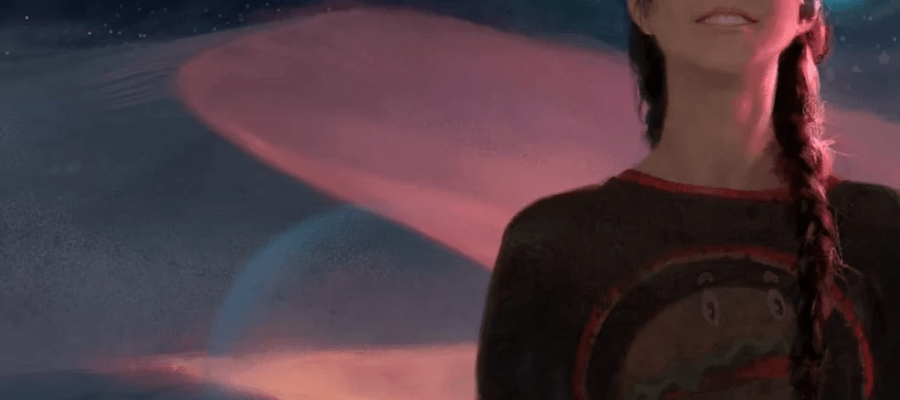
Still, I did open saying that we should talk about girls. And Nona is a girl. Nona is a pile of tragedy in the shape of a girl, she’s the outline of two different very bad sins in that are for the moment, flowing into a place that looks like and therefore gets treated like a girl, but that’s good enough. Lots of people only flow into the space of being a girl temporarily.
It’s a story about girl.
When I talked about Miraculous, and I swear if you came here from cool places where cool people hang out and wear cool skull makeup I promise I’m not making fun by bringing this up, but when I talked about Miraculous, it was about the way that there is a way that ‘girl stories’ are treated as foundationally unserious, lacking in some way. A story that is about a girl and the things that concern a girl, are typically going to be treated as if the girl things are frivolous. A babysitting problem, an upcoming birthday party, not being accepted by the cool kids… these are real concerns that in a story, you’re usually going to see as focal to a girl’s attention, and ultimately resolved for being meaningless.
Nona the Ninth is built around a handful of these stories. These ‘girl things.’ They’re not irrelevant. They matter immensely, because they matter to Nona, and they matter to Nona, because they’re important. They’re some of the most important things that happen in her whole life after all.
There’s this book that’s kind of a touchstone for Australian millenial kids, which is ironic to bring up here because I haven’t read it, called Looking For Alibrandi. It’s a coming of age story set in 1992 Sydney, and tells the story of a complex life of a normal girl, whose position in life is entirely mundane and ordinary, but whose normal life is explained in sequences that forefront how that normalness makes her feel. Looking for Alibrandi is generally held up as a book centering youthful relationships, life as a growing teenager, the intersection of school and very real pains that can happen to teenagers. It deals with the racism and xenophobia Italian-Australians suffered in the 90s, early relationships in their sexual and romantic ways, and the way that our parents make the best decisions they can that sometimes have terrible results.
It’s strange to feel similar notes – the things I see people use Looking for Alibrandi to evoke are here, evoked again in Nona the Ninth. Nona’s story has a lot more skeletons in it, but there’s still that same grinding impossibility, the difficulty of living in a world that’s doing what it can to take care of you even as it makes demands of you. Discovering that people did things for bad reasons doesn’t change what they did, just as much as finding that doing something for a ‘good’ reason doesn’t really matter if the act is inconscienable.
Again, there’s this experiential focus on being Nona. How Nona lives in the world, how she gets around in it, what she feels about it, what’s obvious to her and what’s invisible to her are all parts of the experience of reading this book about and for and through Nona. There’s a lot of very real-feeling situational pains and feelings. There’s a point, where Nona describes the tips of her ears getting hot. The description of the difficulties of getting Noodles’ booties on (as someone with a dog that must sometimes wear booties, it is, yes, fantastically frustrating). The ways you find to have fun when you don’t have any resources. Playing. Playing with paper, making fun out of terrible stories. Playing with honesty and bravado. Playing with nothing. Nona has a life that echoes painfully to me and I do not know how much of it is drawing out old memories and how much is instilling new ones.
Nobody has been as homeschooled as Nona even though she’s not homeschooled.
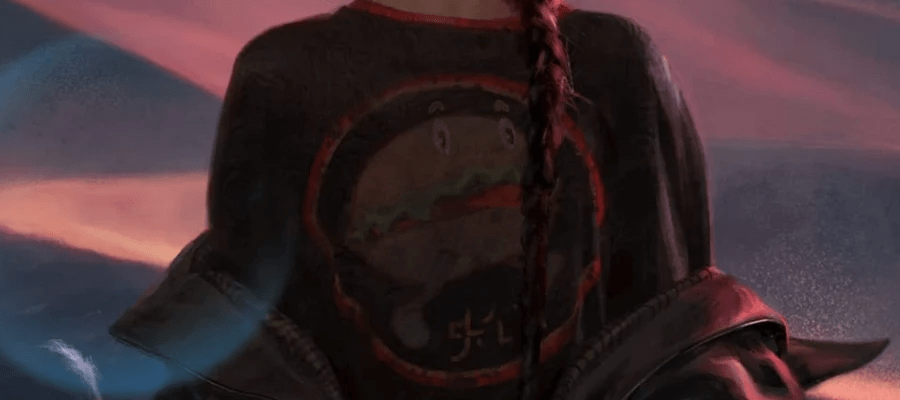
I cannot stop thinking about the post-apocalyptic nature of this story. I can’t stop thinking about the idea of setting a story about necromancers killing worlds to satisfy their own needs for expansion then drawing it back to the heart of our now where men who turn the bones of the earth into gold. I don’t know how to grapple with the way that millenial art has as this recurrent thread the horrors of our now and future, just… there. Just part of the story.
I also can’t not think about love. John, the Anxious Millenial Cow Boy, frames his act of omnicide as an act of love. He tells it like a love story and about how what he was doing was for the best of people, and there’s even a point where someone tells him that he’s too vindictive. And he is, yeah, that’s very much there, but even in the telling of it, he’s the one who says that. He brings up the claim that someone warned him about it, even as he did it. It makes sense to him.
It makes it more tragic, maybe. Right?
He is the one who tells you that he was warned about being vindictive.
(It’s almost definitely not meant to be, but I like to imagine the country he got his suitcase nuke from was North Korea. Officially, the head of state of North Korea is Kim Il-Sun, the grandfather of the current head of state, and who rules the country immortally from heaven. It is literally, already, a necrostate.)
The story is unreliable, which the book makes explicit. John is telling you what he wants you to hear and he wants you to hear that. He, like many abusive men like him, wants to act as if he has reconciled with it. Ah, I’m a hard man, but. I’m tough, but. Can’t you see how this hurts me?
He also recreates an Adam-and-Eve story, which I kind of love when I see it replicated in a way that uses it as a metaphor for abuse. The narrative presented in the Bible is that of a man who exists, and then a woman who is born from him, and thereafter, does all the birthing. It takes the primal vision of the simplified idea of the woman, the mother, and makes it not a trait she has, but a trait bestowed upon her by the true source of life, the man. Here, John makes a woman; binds himself to her, marries her, and then abuses and kills her. It’s a speedrun of shitty dudes who are convinced they’re too smart to be that bad.
He is so much and he is everything all at once. He is an abusive father, demanding his daughter play a role, leaving her maimed so she remembers what she loses for defying him, speed holes or not. He is a project lead who centralises that power, a cult leader convinced he’s fooling people for the right reasons, and a tragically mourning fascist dad fantasy who has constructed the universe around him to justify the fascism. John talks of love, but love doesn’t know him.
Love is a thing you can feel and you can say even if you don’t know what it means to know it. Love is a thing you can use to justify evil, and in my lifetime, I’ve dealt with that. Love is the great excuse, and love is the endurance beyond death. As much as we have souls, we have love. And love is a burden and it is a torment and it is a privilege. There’s this phrase, fond of by people like John, that what is done in the name of love is beyond good and evil.
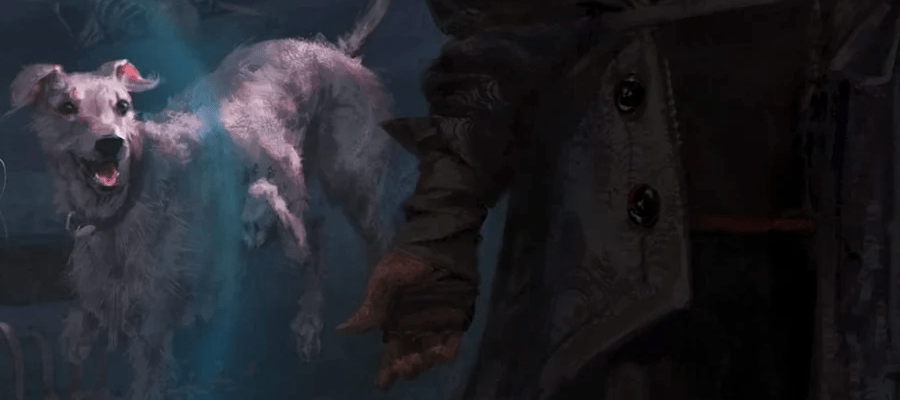
I really love this book. I love how it made me feel and I love things it made me think about. I did find myself weirdly drawn, in the fucked up way I am, to the character of the seventh, to the devils with their wrong eyes. It’s pretty sad that my reaction to this world is to see myself in things that shouldn’t be.
Nona loves you, and I love Nona.
And now Nona gets to rest, as the monsters start to happen.
Oh and I love Noodle too. Noodle is a good dog.
Back To Gideon The Ninth